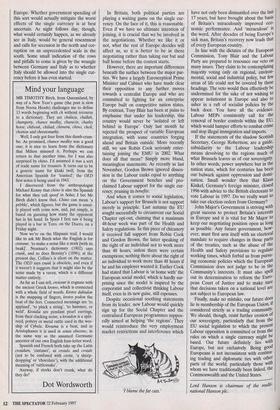Mind your language
MR TIMOTHY Birch, from Queensland, by way of a New Year's game (the post is slow from Noosa Heads) challenges me to define 13 words beginning with ch without recourse to a dictionary. They are chalaza, challah, champerty, chance medley, characin, charley horse, chibouk, chiliad, chimera, chino, choli, chorion and chrestomathy.
Well, I only got four from this dumb-cram- bo. As promised, chance medley was a good one; it is nice to learn from the dictionary that Milton misused it. Perhaps we can return to that another time, for I was also surprised by chino. I'd assumed it was a sort of trade name for trousers. It turns out to be a generic name for khaki twill, from the American Spanish for `toasted'; the OED first notes it being used in 1943.
I discovered from the anthropologist Michael Kenny that chino is also the Spanish for what they call spoof in Soho; I bet Mr Birch didn't know that. Chino can mean 'a pebble', which figures, but the game is usual- ly played with coins now, and, put simply, is based on guessing how many the opponent has in his hand. In Spain I first saw it being played in a bar in Toro, on the Duero, on a Friday night.
Now we're on the Hispanic trail, I would like to ask Mr Birch what the English is for crotorar, 'to make a noise like a stork [with its beak]'. Neuman's dictionary (1802) says crunk, and so does Bensley's (1896); at the present day, Collins's is silent on the matter. The OED says crunk is obsolete, and even if it weren't it suggests that it might also be the noise made by a raven, which is a different matter entirely.
As far as I can tell, crotorar is cognate with the ancient Greek kroteo, which is connected with a whole field of words. Krotos daktulon is the snapping of fingers, krotos podon the beat of the feet. Connected meanings are 'to applaud', 'to pluck a string', 'to hammer, or weld'. Krotalia are pendant pearl earrings, from their clacking noise; a krotalon is a split- reed, pottery or metal rattle used in the wor- ship of Cybele. Krouma is a beat, and in Aristophanes it is used in sensu obsceno, in the same way as the assumed Germanic ancestor of our own English four-letter word.
Spanish and French both take up the Latin crotalum, 'castanet', as crotalo and crotale (not to be confused with crotte, 'a sheep- dropping' or 'chocolate'), with the additional meaning of 'rattlesnake'.
Anyway, if storks don't caulk, what do they do?
Dot Wordsworth


























































 Previous page
Previous page